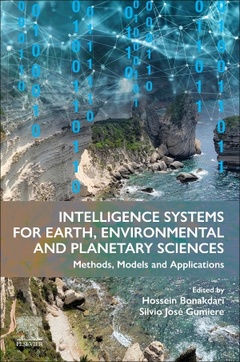Intelligence Systems for Earth, Environmental and Planetary Sciences Methods, Models and Applications
Coordonnateurs : Bonakdari Hossein, Gumiere Silvio José

Intelligence Systems for Earth, Environmental and Planetary Sciences: Methods, Models and Applications provides cutting-edge theory and applications of modern-day artificial intelligence and data science in the Earth, environment, and planetary science fields. The book is divided into three parts: Methods, covering the fundamentals of intelligence systems, along with an introduction to the preparation of datasets. Models, covering model development, data assimilation, and techniques in each field. Applications, presenting case studies of artificial intelligence and data science solutions to Earth, environmental and planetary sciences problems, as well as future perspectives. This book will be of interest to students, academics and post-graduate professionals in the field of applied sciences, earth, environmental, and planetary sciences, and would also serve as an excellent companion resource to courses studying artificial intelligence applications for theoretical and practical studies in Earth, environmental, and planetary sciences.
1. Smart techniques for Earth, environmental and planetary sciences 2. Data preparation processes 3. Meta-heuristic algorithms for Earth, environmental and planetary sciences 4. Standard to Advanced version of meta-heuristic algorithms 5. The application of machine learning and evolutionary computational techniques 6. Case studies of applications of evolutionary computational techniques 7. Future applications
Silvio José Gumiere has been a professor in the Department of Soil Sciences at Laval University since 2011, after obtaining his Ph.D. in hydrological and erosion modelling from the GAIA doctoral School, Montpellier France. Since 2006 he has been working on various aspects of soil erosion, hydrology and soil physics as well as on the development of modelling tools for water and soil management in agricultural systems. He is an expert on the application of R-based numerical, statistical and geostatistical methods, such as time series analyses, image and signal processing, erosion modelling and spatial hydrology and spatial interpolation methods. His research has been published in over 50 papers in international journals with over 870 citations. He has also given ~70 presentations at national and international conferences. He is a Guest Editor for several special issues on hydrological modelling and machine learning techniques for solving applied science problems in hydrology, soil sciences, soil hydrology and environmental journals.
- Facilitates the application of artificial intelligence and data science systems to create comprehensive methodologies for analyzing, processing, predicting and management strategies in the fields of Earth, environment, and planetary science
- Developed with an interdisciplinary framework, with an aim to promote artificial intelligence models for real-time Earth systems
- Includes a section on case studies of artificial intelligence and data science solutions to Earth, environmental, and planetary sciences problems, as well as future perspectives
Date de parution : 08-2024
Ouvrage de 290 p.
15x22.8 cm



